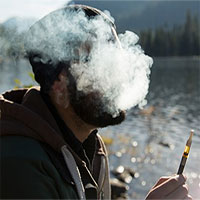The Manchu court had a total of 12 emperors who ruled China, but up to 11 people died because of problems related to nature.
Emperor Gia Khanh was the 15th son of Emperor Qianlong. He ascended the throne at the age of 36 and remained on the throne until his death at the age of 60. He was famous as a virtuous king and was credited with punishing visits such as Hoa Than or Phuc Truong An or eradicating the opium trade that was very popular in China at that time.
But he was an emperor without much luck. He used to be assaulted by assassins just because… the assassins were too poor, didn’t know what to do for a living, so he thought of a way to assassinate the emperor. His palace was also attacked by rebels, threatening the harem and controlling the emperor.

Gia Khanh is the emperor who did not have much luck. (Illustration).
At the age of 60, he passed away. The official historical documents also only record in general that the Emperor suddenly died at Thua Duc Son Trang on September 2, 1820. But people were whispering about the real cause of the king’s death. This is due to lightning strike!
Some say that, while hunting, Emperor Gia Khanh became so sick that he had to stay in bed for treatment while still handling official affairs. One day, the sky above the palace where he was resting suddenly became dark, dark clouds, thunder and lightning, signaling a storm was about to come. Then, during heavy rain and wind, lightning appeared, and unfortunately, a bolt of lightning struck the palace where the king was lying; The emperor was also struck by lightning and died quickly.

One theory is that lightning struck the palace where the king was resting.
According to some other sources, during a hunting trip, Gia Khanh and his ministers, after many days of wandering, did not get any spoils except a few rabbits. The emperor was extremely disappointed, plus he was tired after many days of sitting on horseback, so he ordered the hunt to end and return to the palace.
On the way back, suddenly the weather turned bad, stormy rain came; Suddenly, a large lightning bolt after thunder hit the king, causing him to fall off his horse and leave while the whole entourage was unharmed.

Gia Khanh ordered the hunt to end after many days without any outstanding spoils.
During the Qing Dynasty, Beijing was chosen as the capital, the center of the country. In terms of weather conditions, this place has a rather harsh winter with very low temperatures and often fog. In addition, the number of architectural works is increasing, the population density is increasing, and in winter, burning coal for heating has caused dust particles to accumulate over time.

Beijing – the capital of China during the Qing Dynasty.
The book “Original History” describes days in Beijing that were surrounded by fog, smog, and sunlight for several days in a row. In the Qing Dynasty, the 60th year of Kangxi, it was recorded that, on the day of the announcement of the entrance exam results, fog was everywhere, the wind was blowing, and the dust and sand were dense. In the 16th year of Ham Phong, the situation still did not improve when there was little snow but a lot of fog, strong winds brought smoke and dust.
Beijing has 3 sides bordering mountains, so fog and smog are easy to condense but difficult to disperse; This has made the health of the people here, no matter how carefully and carefully cared for, it is more or less affected such as heart disease and blood vessel disease.

Every winter, Beijing is shrouded in fog and smog.
In the book “Strange information that no history class has ever mentioned: Medical information beyond history books” by doctor Tan Kien Thieu, he revealed that there were 10 emperors of the Qing Dynasty, in which Kangxi and Qianlong have died, which is caused by the influence of air pollution.
Statistics show that all generations, the Qing emperors died in the late winter – early spring, a total of 10 people. King Thuan Tri died on the 7th, Qian Long on the 3rd, Dao Quang on the 14th and all in January. As for the emperors Khang Hy, Dong Tri, Quang Tu, and Tuyen Thong, they all passed away on the last cold days of winter.

Qianlong’s cause of death is speculated to be air pollution in Beijing. (Pictured).
Apparently, it was because the air was filled with smoke and dust, along with such harshness, that the kings, even with great care, could not withstand the weather; rapid disease and glaciation.
The Qing Dynasty (Manchu Qing) was founded by the Ai Tan Giac La family in the Southeast region of Russia in 1616 with the original name of Hau Kim. In 1636, it was changed to Qing and in 1644 re-occupied and occupied the capital in Beijing from the Ming Dynasty. The Qing Dynasty experienced 12 kings, lasted until 1912, if only counted from the time it took the name of Qing, it lasted for 276 years.

